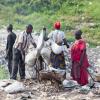
A working group consisting of Austrian, German, and Swiss meteorological services and various federal, regional, and climate research institutes has presented a recommendation on a standardized German-language description of the illustrative climate change scenarios of the Intergovernmental Panel on Climate Change (IPCC).
Earlier this month, the IPCC presented the results of Working Group III of the Sixth Assessment Report (AR6), focusing on the Mitigation of Climate Change.
Climate change scenarios are an important component in the development of target-oriented measures toward climate change mitigation, and in climate research in general. They are tools for assessing the future development of the climate throughout the 21st century under certain conditions. They are based on different assumptions regarding the development of society (e.g., world population, urbanization, education) and the economy (e.g., type of energy generation, technological development, and economic growth), taking the resulting development of climate-relevant greenhouse gases and aerosols into consideration, and serve as an input to climate models, which simulate the future evolution of climate according to a given greenhouse gas emission trajectory. The illustrative scenarios help to assess the effects of different socioeconomic developments individually or jointly, and independently from climate protection and different climate mitigation efforts.
Until now, there was no consistent terminology in the German-speaking area, resulting in various terms being used for the same climate change scenarios. This has frequently led to irritation and confusion. To facilitate communication, a working group comprised of German, Austrian, and Swiss meteorological services as well as various federal, regional, and climate research institutes presented a recommendation for a uniform terminology, description, and color scheme for a number of IPCC climate change scenarios earlier this year.
The Austrian representatives in the working group were Marc Olefs, Head of the Climate Research Department at the Zentralanstalt für Meteorologie und Geodynamik (ZAMG) – the Central Institution for Meteorology and Geodynamics – and Thomas Schinko, who leads the Equity and Justice Research Group at IIASA.
“A clear, standardized formulation is the basis for understanding the long-term consequences and effects of different measures. This again is the prerequisite for reaching a broad recognition of the importance of measures to be taken for climate change mitigation and for proceeding from knowledge to action,” explains Olefs.
“This standardized terminological classification of the scenarios allows for an unambiguous communication of the latest research results of the German-speaking climate research community and the media. The concise description of the climate change scenarios presents an important basis for the development of climate change mitigation measures and defines the challenges for adapting to the effects of climate change,” Schinko concludes.
Further information
Recommendations for the classification of selected climate change scenarios: Download PDF
Intergovernmental Panel on Climate Change (IPCC): www.ipcc.ch
Adapted from a press release by ZAMG. Read the original text here (in German).
News

05 June 2024
The 2024 State of CDR Report: Scaling up CO2 removal to meet Paris Targets

23 April 2024
US Permanent Representative to International Organizations in Vienna visits IIASA

15 April 2024
